The Education and Public Programs Team at the Nixon Library is pleased to remind you that the National Archives and Records Administration (NARA) continues to be an excellent source for entertaining and historical content! Simply follow the links below for additional information.
![]()
50th Anniversary of the Release of The Pentagon Papers
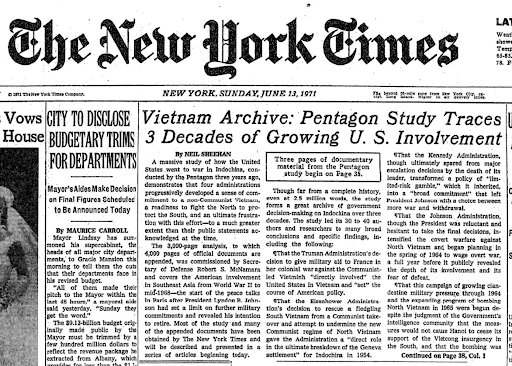
The Times published the first installment of the Pentagon Papers, a top-secret history of the Vietnam War, on June 13,1971. Credit: The New York Times Corporate Archive
Sunday, June 13, 2021, marked the 50th anniversary of the New York Times publication of “The History of U.S. Decision-Making Process on Vietnam," otherwise known as the Pentagon Papers. The Times planned to release a series of excerpts beginning with the front page headline “Vietnam Archive: Pentagon Study Traces 3 Decades of Growing U.S. Involvement.” A second front page installment of the series was published on June 14, 1971, titled “Vietnam Archive: A Consensus to Bomb Developed before ’64 Election, Study Says,” drew the ire of Attorney General John Mitchell. On June 15, after the third installment was published, a temporary restraining order issued by the Department of Justice prevented further publication of the classified material. Its publication, and the ensuing controversy, would affect the legacies of four Presidential administrations, become the catalyst of Watergate, and distort the nation’s view of wartime politics.
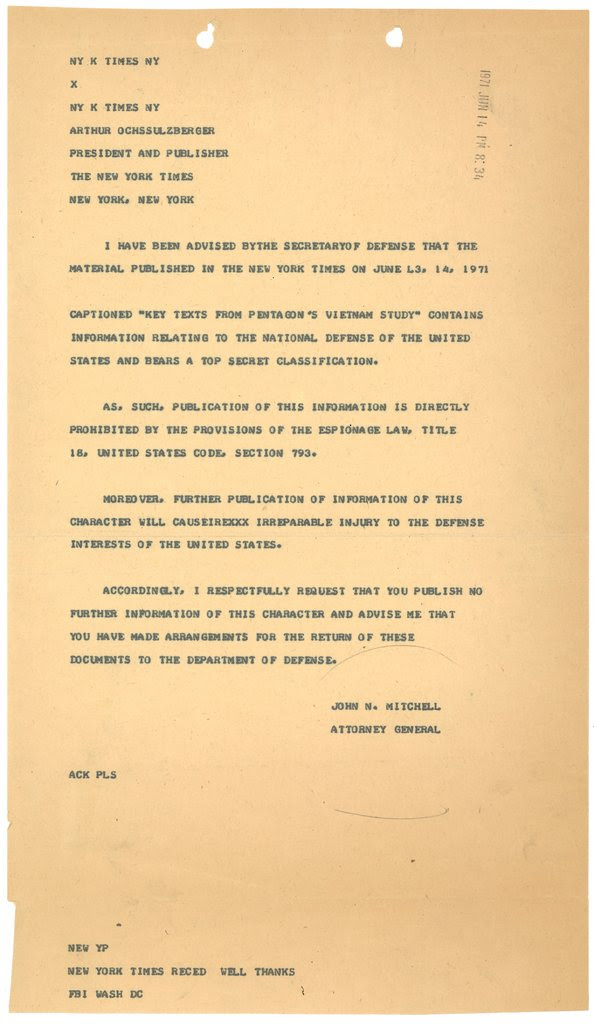
On June 14, 1971, John N. Mitchell, the United States attorney general, ordered The Times to stop publishing the Pentagon Papers. The Times declined, and an injunction soon followed. Credit: The New York Times Corporate Archive
![]()
The Study

Cover page of "The History of U.S. Decision-Making Process on Vietnam." Credit: The UVA Miller Center
Commissioned by Robert McNamara, Secretary of Defense for the Johnson administration, the Pentagon Papers documented the United States involvement in Southeast Asia during the years of 1945-1967. According to The Washington Post, "McNamara has insisted that he authorized the study to preserve for scholars the government documents that chronicled the key decisions resulting in the United States' involvement in an Asian land war.” It consisted of thirty-six analysts who used confidential archival documents from the Department of Defense, State Department, and Central Intelligence Administration (CIA) to compile information. A 7,000 page, 47-volume "Top-Secret” study, was completed in 1969, five days before Richard Nixon's inauguration. The study revealed that the Truman, Eisenhower, Kennedy, and Johnson administrations had misled the public about the extent of the nation's involvement in Vietnam.
![]()
Daniel Ellsberg and the Leak
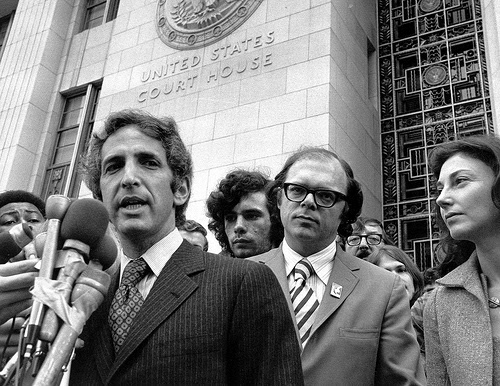
Daniel Ellsberg at the Los Angeles courthouse, 1973; Anthony Russo and Patricia Ellsberg to his right. Credit: Associated Press
Dr. Daniel Ellsberg worked for the RAND Corporation think tank beginning in 1958 on nuclear strategies. In 1964, he was recruited by the Department of Defense to work as a military strategist under Defense Secretary Robert McNamara to be one of the thirty-six analysts assigned to the Pentagon Papers study. A combination of time spent working alongside the military in Vietnam and the information the classified study revealed changed Ellsberg’s view of the war. From avid support to staunchly against the war effort, he believed “that if members of the public learned what the study revealed, they would have a similar conversion...” With the help of colleague Anthony Russo, Ellsberg copied the research and began sharing it with the antiwar politicians of the Senate. When official channels failed, he contacted Neil Sheehan of the New York Times and met with the reporter in March 1971. The Federal Government charged both Ellsberg and Russo with violating the Espionage Act of 1917; their trial began in Los Angeles on January 3, 1973. Federal judge William M. Byrne Jr. dismissed the case against both men after governmental misconduct and illegal evidence gathering became exposed.
![]()
The Media and Publication
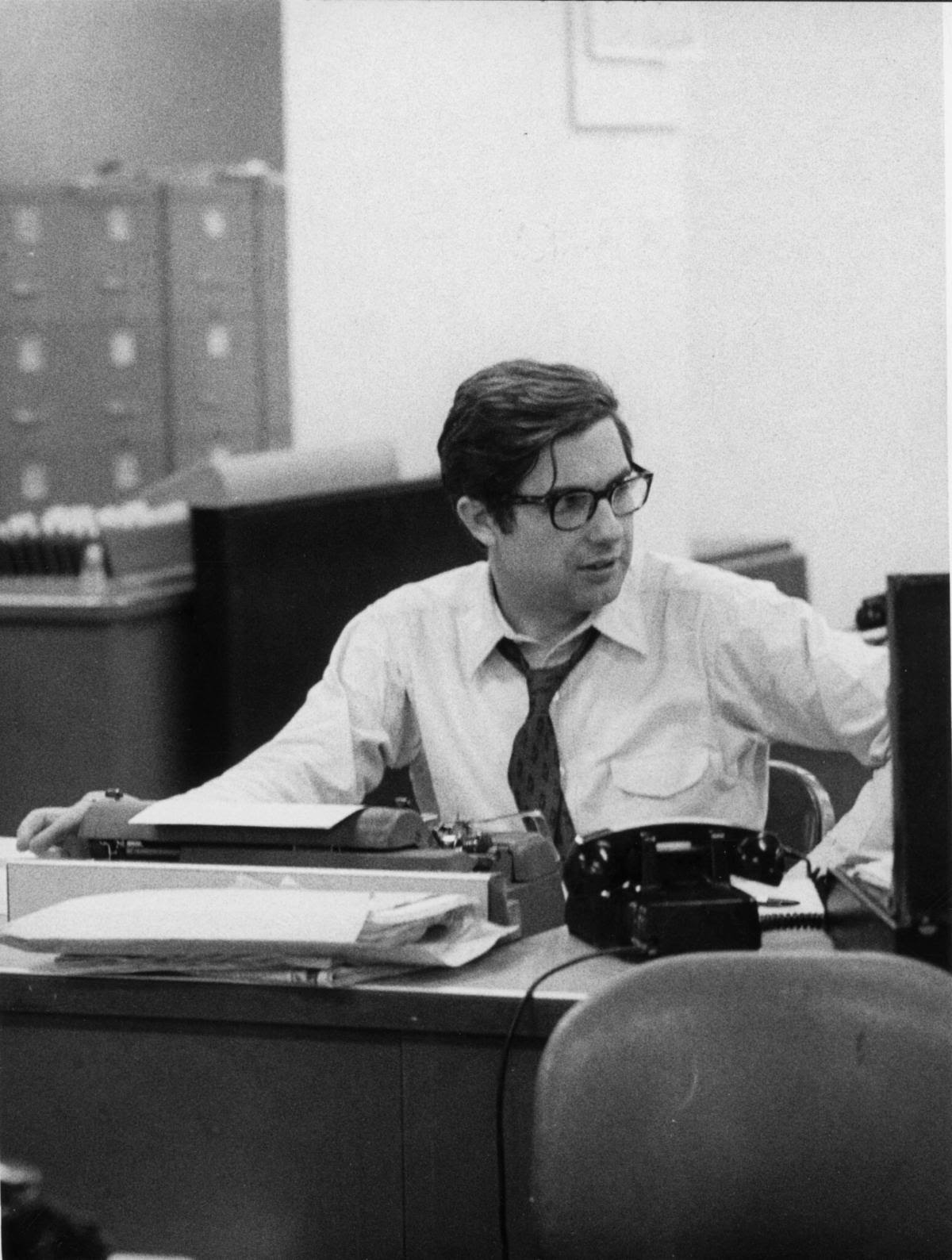
Neil Sheehan in 1972 on the day The New York Times won the Pulitzer Prize for Public Service for its coverage of the Pentagon Papers. Mr. Sheehan was at the center of the episode. Credit: Barton Silverman/The New York Times
In a 2015 New York Times article, reporter Neil Sheehan explained how he acquired the copy of the Pentagon Papers, the motivations behind the publication, and the repercussions that followed. The temporary restraining order was successful until the Washington Post picked up the mantle and began publishing the series. Once there was a restraining order issued against the Washington Post, the Boston Globe started releasing articles. Legal whack-a-mole continued until over a dozen media outlets had copies of the study. Court orders against the publication stated that further public distribution of classified materials threatened national security but the New York Times refused to follow the order. In the following cases, it argued that the "media’s use of classified government information was not only routine but was essential to the operation of a free press.” New York Times Co. v. The United States made its way to the Supreme Court, and oral arguments based on prior restraint began on June 26, 1971. On June 30, 1971, the Supreme Court 6-3 decision in favor of the Times liberated the media to start publishing unfettered.
![]()
Senator Gravel and the Congressional Record

Senator Mike Gravel (D) of Alaska, served 1969-1981. Credit: Library of Congress
Following the June 13, 1971 New York Times publication of the Pentagon Papers, Senator Mike Gravel of Alaska, believing the constituents had a right to know about the United States involvement in the war, obtained a copy and read 4,000 pages into Congressional Record, making it available to the public. He also arranged for private publication of the incomplete version of the study through Beacon Press. A grand jury empaneled and subpoenaed Gravel's aide to investigate if, in reading the papers into the public record, Gravel had violated federal law. In Gravel v. The United States, held on April 19 and 20 of 1971, the senator argued that the Speech or Debate Clause of the United States Constitution applied not only to congressional members but also to the congressional aides in their service. Although the Court denied his motion, it did limit the scope of questioning, and later, on appeal, the courts deemed congressional aides protected by the clause regarding legislative acts.
![]()
Post Publication
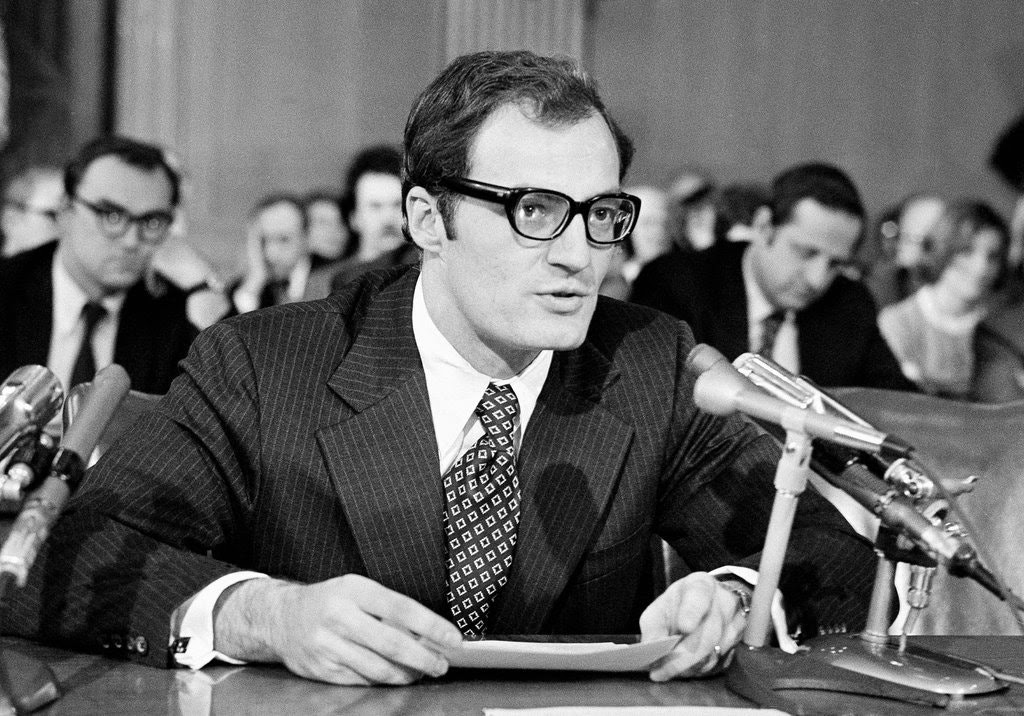
Egil Krogh appeared before the Senate Commerce Committee after being nominated for Undersecretary of Transportation in January 1973. He resigned from the post in May that year as a criminal case against him was building. Credit: Associated Press
Publication of the Pentagon Papers in 1971 affected the legacies of five presidential administrations, including the four presidents leading up to and including Richard Nixon. It illustrated to the public that the administrations of Truman, Eisenhower, Kennedy, and Johnson had misled their constituents about America’s intentions in South East Asia. The Supreme Court decision in favor of the New York Times, the national discord regarding the war, and the upcoming election weighed heavily on the Nixon administration. Continued publication of classified documents by the media along with new information stating that Ellsberg had access to confidential matters well beyond the study motivated President Nixon to create the "leak project." This group of "plumbers" worked with agencies to investigate and interview for possible confidential leaks. It consisted of Egil Krogh, David Young, Howard Hunt, and G. Gordon Liddy. Looking for information to discredit Ellsberg, the group broke into the office of his psychiatrist, Dr. Lewis Fielding, looking for his motivation, intentions, and possible co-conspirators. As the "leak project” leader, Egil Krogh, Deputy Assistant to the President for Domestic Affairs, authorized the break-in and later pleaded guilty to "conspiracy to violate civil rights.” Sentenced to six years, he ended up serving four and a half months in federal prison. A little over nine months later, police arrested five burglars with ties to Hunt and Liddy breaking into the Democratic National Headquarters at the Watergate complex in Washington, DC. Krogh and many others have stated that the Fielding break-in was the precursor to Watergate, which ultimately led to the end of Nixon's presidency.
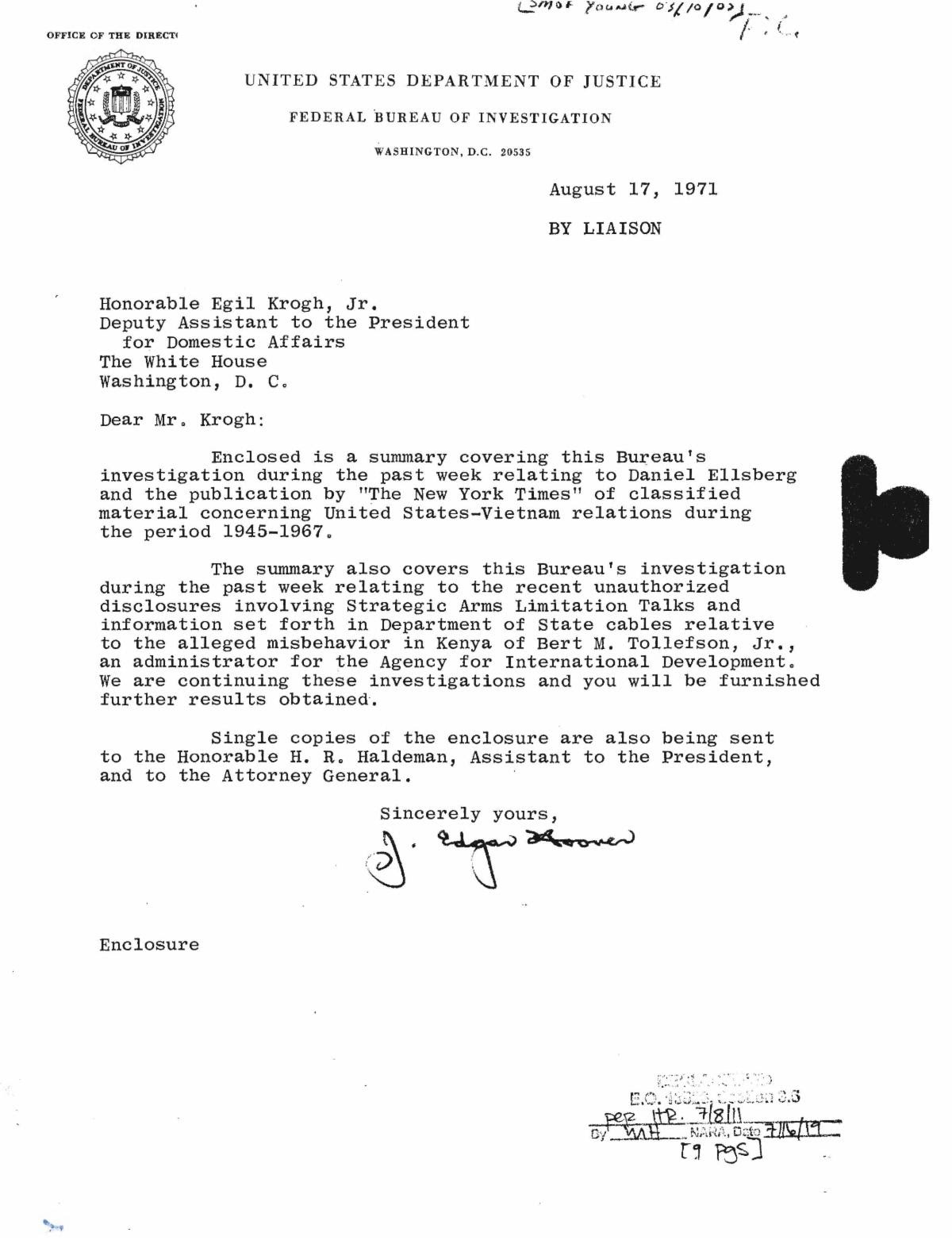
Memo from FBI Director J. Edgar Hoover to Egil Krogh about Daniel Ellsberg and the Pentagon Papers from folder [10] Hoover's Reports to President; box 14; White House Special Files, Staff Member Office Files, David R. Young, Jr.
![]()
Declassification

Richard Nixon Presidential Library and Museum in Yorba Linda, California. Credit: the National Archives and Records Administration
On May 4, 2011, the National Archives and Records Administration announced the declassification of the Pentagon Papers. June 13, 2011, forty years after its first publication, the complete study arrived at the Richard Nixon Presidential Library and Museum. The National Archives news release dated June 8, 2011, stated that "conditions under which the copies of the Report were made and distributed, coupled with the speed with which the copies were distributed and the urgency to publish the material, meant that the newspaper and magazine releases of the Papers covered only a very small portion of the 7,000 page Report.” For more information regarding the Pentagon Papers and the key figures involved, please visit the sites suggested below.
National Archives/ Research Our Records/ Pentagon Papers
"National Archives and Presidential Libraries Release Pentagon Papers"
Richard Nixon Presidential Library and Museum Research Bibliography: The Pentagon Papers
Records of the Watergate Special Prosecution Force
The Pentagon Papers: Declassified
Daniel Ellsberg on leaking the Pentagon Papers.

